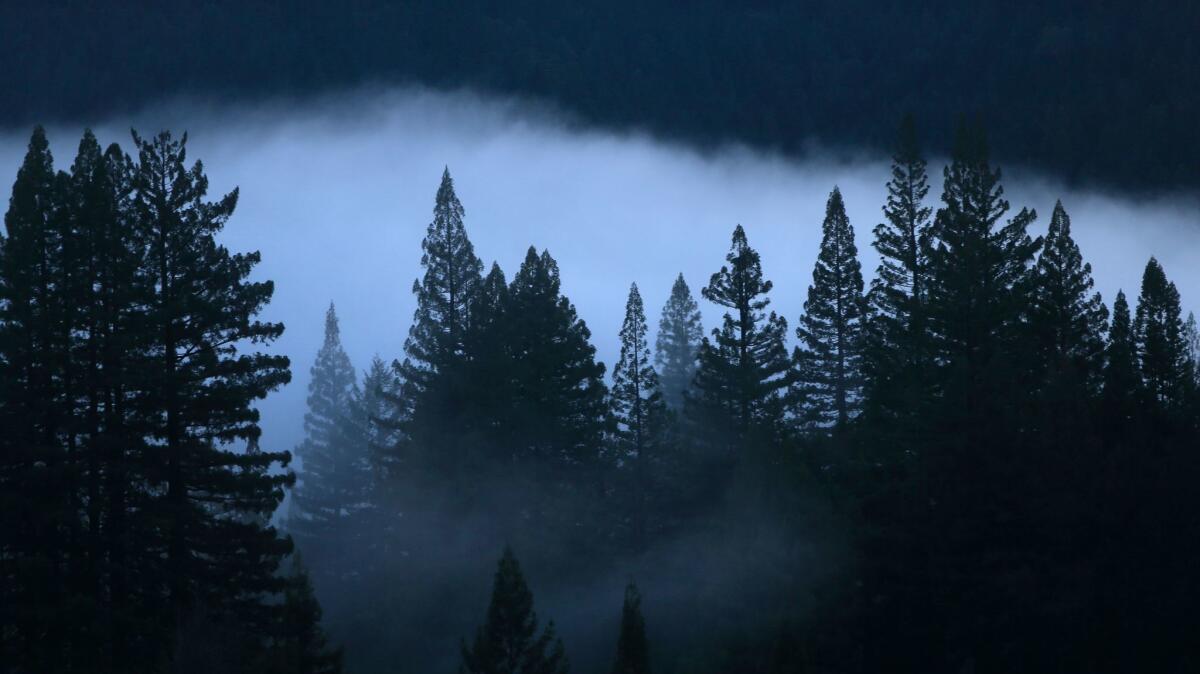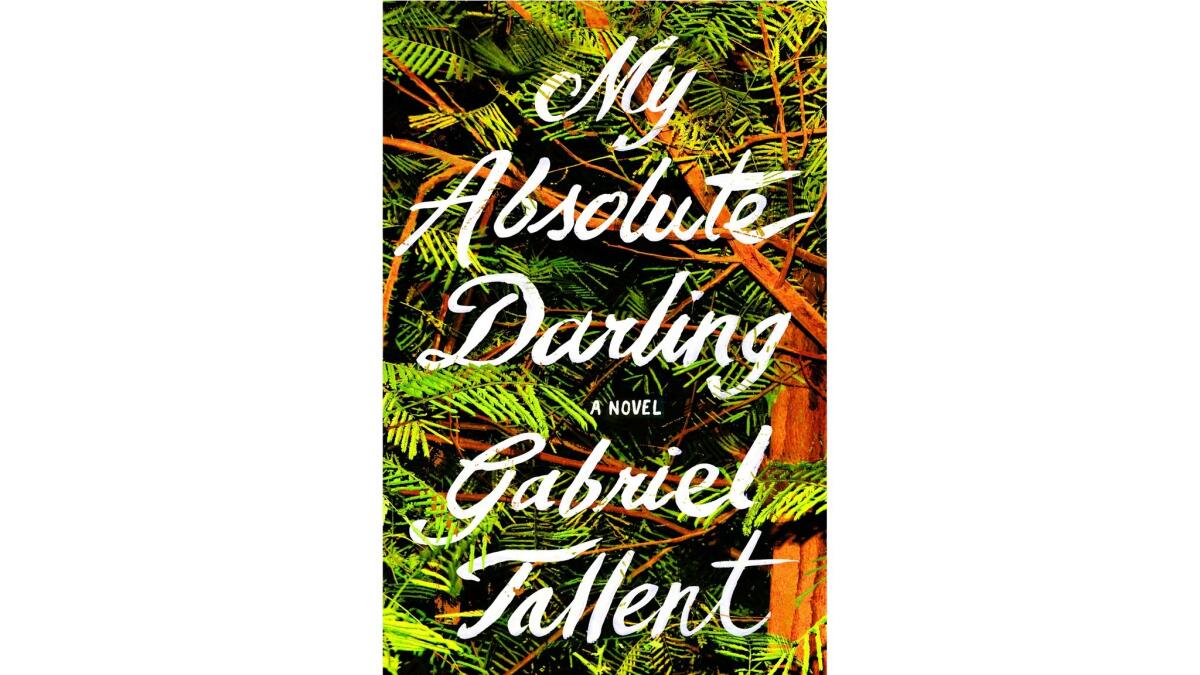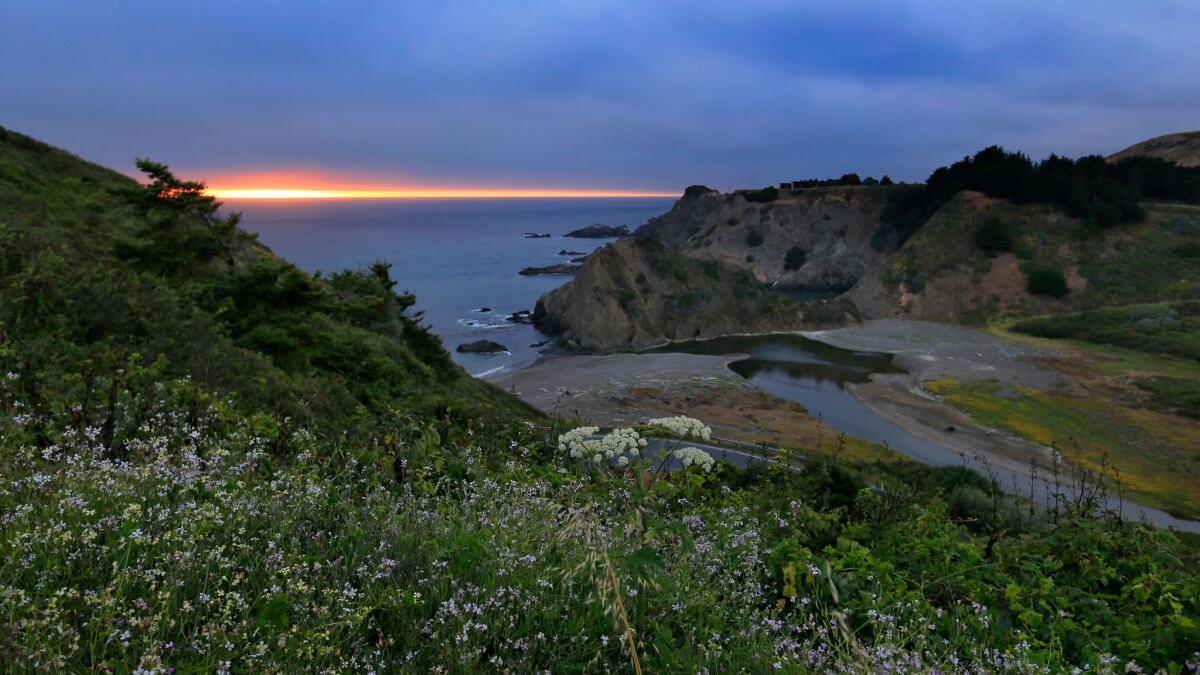Q&A: Gabriel Tallent discusses his powerful debut novel, ‘My Absolute Darling’
- Share via
Gabriel Tallent left California years ago, but California never left him. The author of the debut novel “My Absolute Darling” (Riverhead, $27) was born in New Mexico, then spent his childhood in Mendocino, mostly outdoors, developing wilderness skills that he’d later use working as a trail leader for youth groups in the Pacific Northwest.
“My Absolute Darling” is a kind of love song to Mendocino, although the subject matter is anything but pastoral. The novel follows 14-year-old Turtle Alveston, who feels more at home in nature than she does at home. She’s a gifted scout and sharpshooter and takes to the countryside around Mendocino partially to avoid her survivalist father, Martin, who abuses her physically, psychologically and sexually. When she meets a kind, funny high school boy, she starts to consider the possibility of escape from her painful home life.
Tallent spoke to The Times by telephone from Salt Lake City.
How did the character of Turtle come to you?
I've been working on this book for so long that Turtle goes back through 15 or 16 generations of herself, with each draft following what has felt true in the last draft. There's a way that a real person feels on the page, so I pursued that and tried to resist any impulse to make it easy or simple or neat and, instead, just pursue where it felt right. [It’s] like if you knock on a piece of wood and it feels solid, like it has some depth to it. [I was] pursuing that in a narrative sense.
Was it difficult getting into the mindset of a 14-year-old who's been forced to grow up in these really awful ways?
It definitely required a great deal of attention to Turtle herself, and it required a very careful taking seriously of her mind, because any sort of summary judgment is always easier and more facile and less true. So it took a sustained attention to the character and to her nuances. In that sense, it was sort of working without rules. I had worked with youth around that age, and I don't know that it helped me, but it gave me the sense that youth go in many different directions. So it gave me the freedom to take her as totally herself, as her own character, without trying to write a type, because I felt that youth so often are more than that.

The scenes of Martin's abuse of Turtle are obviously tough to read. Were they difficult to write, emotionally speaking?
I love writing, and write fanatically, and wrote many of those in long, hard days, trying to get there. I would say writing takes as much of a toll as any other endeavor that matters in your life and leaves you pretty wrecked. But at the same time, just like any other important thing in your life, it feels worth it. That's what gives you the strength to write after a long shift at work, or to write on your only day off, and make the personal sacrifice that is required. Writing is, for me, so time-consuming that it requires a great deal of ruthlessness, and that only feels worth it if you're writing about something that matters. I think important pursuits are oftentimes challenging.
See Gabriel Tallent at Book Soup on Mon. Sept. 11 at 7:00 p.m. »
It's always risky for a male author to imagine a female protagonist, and vice versa. Was that something you were conscious of when you were writing the novel?
Yes. When I quit school and set out to write a book, I spent all of my time writing, and I accumulated this enormous text with a great deal of things going on in it. But Turtle was the best. And when I think about when the novel took shape, it's the moment that I decided to make this book about her, and that was terrifying, to peel away everything else, especially to peel away the material I felt that was closer to home or more comfortable. So I guess what I'm saying is that I arrived at that character through a tremendous labor of writing rather than sitting down and conceiving of a story, and I think because it was sort of step by step, I had realized what it was about, and [was] terrified. Is that what you mean? Are you talking about actually being daunted, or are you talking about the difficulty of projecting yourself into a female character's mind?
Writing is, for me, so time-consuming that it requires a great deal of ruthlessness.... I think important pursuits are oftentimes challenging.
— Gabriel Tallent
Kind of both. [There are] female characters who are typical tomboy [stereotypes], and she doesn't seem like that. She seems like her own person, like she doesn't really care about gender roles one way or another.
That's interesting that you say that, because a lot of times women say to me that she has so internalized the misogyny and is obsessed with its thoughts and its language. So we're even gendered in the terms that we're two dudes talking about this right now. I am writing across a gap of privilege that ought to be acknowledged. And that's why I like this question, and my answer is that I feel like I have my own vantage point on how women I have known have accommodated and overcome trauma. But the important thing to say is that it's not the only narrative, and then we get into the problem of paucity of representation. Sometimes when there are too few narratives, pressure is put on any particular narrative to do everything, which it can't. So I'm writing from a position of privilege, but this is also my culture, Mendocino is my culture, and these are my places, and I grew up among women and feel like I have insight into that. But it's not the sum total of all insights that can be had.

Just as an aside, just pushing back a little bit, because we all experience a culture of misogyny, it is sometimes troubling to me the degree to which women survivors are absent from male fiction. And I don't mean that they're absent as spectacles, because they're all over the place, in every form of media, as spectacles, sort of the hood ornaments of TV episodes and novels, and the justification for doing many things that male protagonists go about [doing] in their books. Sometimes survivors are curiously absent from that fiction in a way that they are not absent from our lives, and I think that erasure is very troubling.
Mendocino almost strikes me as being a character in this novel, not just a setting. What does Mendocino mean to you, as someone who grew up there?
I feel passionately about place and found my way into Turtle's character through her love of place, because I think wilderness, the places we go as children, we go there to learn things about ourselves and to take those skills back into our lives, and that seems to me so essential. Also, we are losing these places. I wrote this book the first time that I was away from Mendocino in a protracted way, and I think that's because that was the first time when the full meaningfulness of the place became visible to me. In a way, you take it for granted, and then when you lose it, it becomes visible. [This] plays into my concerns about global warming, that this is a disaster that we're not able to conceive because we can't conceive what we're losing, we can't make visible what is about to be lost to our imaginations. So that was my two-fold concern: my love of place and also my tremendous anxiety about environmental destruction.

One of the characters in the book that shares that concern is Martin, who's obviously in most ways a really unsympathetic character.
Martin is sort of a co-protagonist in the book, who is fighting to be more and greater than his injuries, and he's trying to do it for his daughter. I think that we have all seen people struggle to be more than they were raised to be, and we all have seen people fail. Martin is a person of, at times, tremendous prescience about the world, and he has flashes of clarity. He's raised a pretty cantankerous daughter, and that's not something you do as a totally unredeemed person. That is an accomplishment that, as divided as he is, speaks to something about his character.
Sometimes survivors are curiously absent from that fiction in a way that they are not absent from our lives, and I think that erasure is very troubling.
Martin’s a compelling character, he's very charismatic, very intelligent. Was it important to you to have him be more fully realized than just a horrible human being with absolutely no redeeming value?
Yeah. I mean, I was never interested in him in being a horrible human being. I think that Martin is the sort of person whose help we need if we're going to change society. Sometimes outsiders like Martin see the structural inequalities with tremendous and difficult prescience. He was always meant to be a character who is deeply divided within himself and struggling within himself to be a good person. He's prepared his daughter with a tremendous degree of fortitude and with tremendous and very clear critical skills for thinking about her life. Those are accomplishments; those are the actions of someone who's trying to be better than they are.
Turtle is very comfortable outdoors. She feels at home in nature; she's a great scout. Were you like that growing up?
Yeah, I spent a great deal of time outside. I used to roam around a great deal, I did a lot of solo backpacking as a child, and I used to go on lots of adventures with my friends out into the woods, sometimes staying out there for a couple of nights. And I felt passionately about the places I encountered, and the wonder of encountering them. [That] is something that is sometimes neglected in contemporary fiction. It's something that becomes invisible when we lose our ability to look for it. The wilderness is almost an acquired taste, something you have to learn a little bit about. And I really wanted to show the reader that love through Turtle's eyes.
Sign up for our Book Club newsletter
Get the latest news, events and more from the Los Angeles Times Book Club, and help us get L.A. reading and talking.
You may occasionally receive promotional content from the Los Angeles Times.




